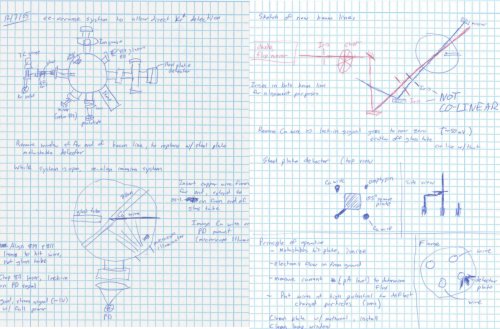In which we look at the end of the Steelypips era and the launch of ScienceBlogs. ———— Before the Great Upgrade derailed things completely for a month, I was working on a recap of this blog’s history, and had gotten up through the end of 2005, which marked the end of my time as an… Continue reading Ten Years Before the Blog: 2005-2006 (Part II, the Start of ScienceBlogs)
Tag: blogs
Excellent Approximations and Lying to Children
In which I talk about the common complaint that we teach students physics that “isn’t true,” and the limits on that statement. ———— Frequent commenter Ron sent me an email pointing to this post by David Reed on “What we “know” that t’aint so…. and insist on teaching to kids!”: he science we teach is… Continue reading Excellent Approximations and Lying to Children
What Does It Take to Evaluate Teaching?
In which we compare a couple of different systems for evaluating teachers, looking at what’s involved in doing a fair assessment of a teacher’s performance. ——– Another casualty of the great blog upgrade, in the sense of a post that was delayed until the inspiration for it has been forgotten by most of the people… Continue reading What Does It Take to Evaluate Teaching?
Spiffy New Digs, Suggestions Wanted
So, as you may or may not have noticed, ScienceBlogs has gotten a makeover. If you read via RSS, you might not notice anything, but if you come to the blog itself, you’ll see a new look. The previous three-column layout is gone, and posts on the front page now show only short excerpts and… Continue reading Spiffy New Digs, Suggestions Wanted
Science, Statistics and the Supernatural
Josh Rosenau has a post about the supernatural, spinning off recent posts about a recent Calamities of Nature webcomic. Josh makes a point that I think is valid but subtle: The issue with the supernatural is not whether it’s part of the universe, but whether it is bound by the same laws as all the… Continue reading Science, Statistics and the Supernatural
Neither a Neuroscientist Nor a Statistician
A bunch of people I follow on social media were buzzing about this blog post yesterday, taking Jonah Lerher to task for “getting spun” in researching and writing this column in the Wall Street Journal about this paper on the “wisdom of crowds” effect. The effect in question is a staple of pop psychology these… Continue reading Neither a Neuroscientist Nor a Statistician
Quantum Mechanics vs. Relativity: It Depends on What “Understand” Means
Sean Carroll and Brad DeLong have each recently asserted that relativity is easier to understand than quantum mechanics. Both quote Feynman saying that nobody understands quantum mechanics, but Sean gives more detail: “Hardness” is not a property that inheres in a theory itself; it’s a statement about the relationship between the theory and the human… Continue reading Quantum Mechanics vs. Relativity: It Depends on What “Understand” Means
Virginia Heffernan Is Our Target Audience
There’s a great post at NeuroDojo on the Heffernan business this weekend, and what the take-away ought to be: Yeah, let’s criticize that she didn’t get past the first impression of science blogs. We should expect Heffernan to look before leaping – she writes for the Times, after all, which still has a certain reputation… Continue reading Virginia Heffernan Is Our Target Audience
It’s Not Just the Length, It’s the Content
The never-ending discussion of whether the Web can or should replace books has shifted into the corners of blogdom that I follow again, with Kevin Drum arguing for more books, Henry Farrell arguing for shorter books, and Jim Henley agreeing with Henry, and expanding it to fiction. They’re all at least partly right– more shorter… Continue reading It’s Not Just the Length, It’s the Content
The Popular Science Writing Process
Via SFSignal’s daily links dump, Lilith Saintcrow has a terrific post about the relationship between authors and editors: YOUR EDITOR IS NOT THE ENEMY. I don’t lose sight of the fact that I am the content creator. For the characters, I know what’s best. It’s my job to tell the damn story and produce enough… Continue reading The Popular Science Writing Process
